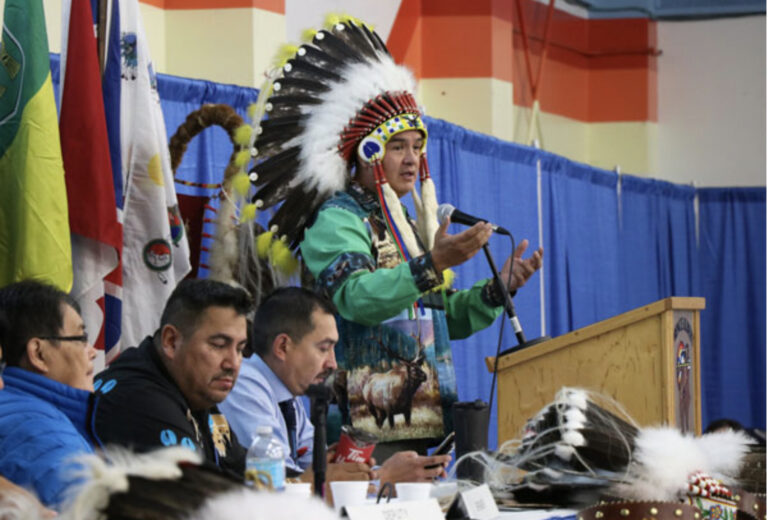
The Federation of Sovereign Indigenous Nations (FSIN) is calling for more support from the province in dealing with an outbreak of COVID-19 at the Buffalo River Dene Nation in Dillon and surrounding communities.
The group representing 74 First Nations in Saskatchewan asked for the RCMP to “ramp up efforts to help curb the spread of COVID-19” on Buffalo River Dene Nation (BRDN) after increased transmission of the virus led to an outbreak as wildfire evacuees returned to the community from Lloydminster.
The First Nation is battling the “quick spread of the deadly virus” that Chief Elmer Campbell said is exacerbated by lack of public health orders and pandemic restrictions.
All public health restrictions – including the mask mandate and gathering limits – were lifted in Saskatchewan on July 11. But Indigenous leadership want an end to public gatherings in BRDN communities and “more enforcement by the RCMP” to ensure residents who test positive for the virus self-isolate.
“Chief Elmer Campbell and his health staff are running out of options and the death of our most vulnerable could increase unless reinforcements are brought in by the Province and RCMP to enforce rules to keep COVID-19 numbers from continuing to climb. We support his calls for action and are calling on Premier Scott Moe to help immediately” FSIN Chief Bobby Cameron said in a statement on Monday.
“We understand that many community members are frustrated and facing ‘COVID Fatigue’ but we must come together to ensure our vulnerable community members are safe. We encourage everyone to get vaccinated immediately and continue to follow safety protocols like wearing a mask, practicing ceremony safely and isolating if you’ve tested positive to stop the spread of COVID-19.”
Meadow Lake Tribal Council (MLTC) Chief Richard Ben said they are doing all that they can to support Chief Elmer Campbell and his staff in the community who he said “are working around the clock to help contain this COVID-19 outbreak but more must be done.”
Northern Inter-Tribal Health Authority (NITHA) Medical Health Officer Dr. Nnamdi Ndubuka said last week that health workers were already spread thin Dillon and surrounding Buffalo River Dene Nation communities.
The First Nation wants to make sure residents are taking steps to avoid further transmission.
“They need more health support staff and they also need the RCMP to step in to enforce health and safety protocols to ensure gatherings are stopped and COVID-19 is taken seriously,” Ben said.
“We encourage anyone who can get vaccinated to do so immediately and to continue to wear a mask and isolate if you’ve tested positive. It’s going to take a coordinated and collaborative effort to get this outbreak under control before it continues to spread.”
“We’ve had an increased number of cases within the far northwest communities. Most of the cases that have been reported are within the Buffalo River Dene Nation,” Ndubuka said.
“The increase is related to the displacement and evacuation due to the current forest fires — that was the main risk factor. Travel outside of the province was also identified as a risk factor for increased transmission.”
Ndubuka said northerners should continue to follow COVID-19 guidelines and take precautions to avoid spread of the disease until a higher vaccination rate is reached.
On Saturday the Saskatchewan Health Authority (SHA) alerted the public of an increased risk of COVID-19 in the northern communities of Dillon and La Loche.
The SHA is “strongly urging” residents, especially those who are unvaccinated to follow the standard protocols around COVID-19 — such as keeping two metres away from others when in public and wearing masks and washing hands often with soap and water.
